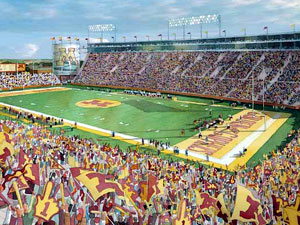|
Audio
Photos
More from MPR
|
 |
| An artist sketch of the proposed on-campus Gophers stadium, which supporters say will generate excitement for the university. (University of Minnesota ) |
St. Paul, Minn. — The University of Minnesota is asking the state to pay 40 percent of the cost of an open-air football stadium on campus.
When the university first came to the Legislature last spring, the total price tag was $235 million, but now the university says the delay has added $13 million to the total cost. The state's contribution remains at $7 million a year, but that price is coming under greater scrutiny.
Sen. Sheila Kiscaden, IP-Rochester, said some of her constituents are concerned about the state's share, which works out to about $1 million for every home game.
"A million dollars a game, $7 million a year, for 25 years," Kiscaden said. "And with the economy not in the greatest shape, energy prices going up and property taxes going up, people aren't as persuaded as the alumni are that this is absolutely necessary."
Kiscaden believes the Gophers stadium will likely pass the Legislature eventually. It has broad bipartisan support, including the backing of U of M graduate Tim Pawlenty. The governor has held off calling a special session, saying legislative leaders could not agree on a limited agenda. But Pawlenty said the stadium is worth a state investment of $7 million a year.
"It's not just about the economics of it, it's also about what it means to our university in terms of excitement and the joy that it brings to people in terms of quality of life experiences, and so we want to get that stadium built for the Gophers," Pawlenty said.
Pawlenty wanted the Legislature to pass the bill this fall, partly because the university has a $35 million contract with TCF Bank that expires at the end of the year. The contract includes the right to name the facility TCF Bank Stadium.
|
We obviously would like to do the deal. But things change, times change, events happen, and it just puts the whole thing in doubt.
- Bill Cooper, CEO of TCF Bank
|
The university also granted TCF the exclusive right to issue and market products like ID and debit cards on campus. TCF CEO Bill Cooper said the company's contribution to the stadium is half charity and half smart business.
"There's 280,000 University of Minnesota alumni that live in the Twin Cities area, and support for the university is good for business," Cooper said.
Cooper said TCF wants to be part of the Gophers stadium. But he can't promise that the company's contract with the U will be extended past the end of the year.
"We obviously would like to do the deal, and get it done, and we'll try to do that," said Cooper. "But things change, times change, events happen -- unforeseen events -- and what it does is, it just puts the whole thing in doubt."
Some lawmakers object to giving the stadium a corporate name. State Rep. Tim Mahoney, DFL-St. Paul, said he'll push to change the name to "Veterans Memorial Stadium." The university had a Memorial Stadium for 68 years, before it was demolished.
Mahoney, whose father fought in World War II, said he thinks the university should go back to its tradition of honoring vets with the name.
"We should have the major public institution in the state of Minnesota as a place where at least six or seven times a year for three or four hours, it's something we could possibly think about, what these men and women have sacrificed," Mahoney said.
Mahoney said he's not trying to bash TCF, and he applauds the company for coming up with a major contribution to the stadium. But his proposal could make the stadium plan a tougher sell because it would cost the state another $1.4 million a year to replace the TCF funding.
If there's no special session this fall, the Gophers' stadium bill will likely have to wait until the next regular session in March. Then, lawmakers' main priority will be passing a capital investment bill that will certainly include a number of University of Minnesota projects.
University officials say they don't want the stadium to detract from the U's other funding requests. Gophers athletic director Joel Maturi said the university will need to persuade lawmakers that the stadium has more uses than just football.
"This is a 100-year project which will be the center of campus, which you'll be able to use for convocation, graduation, it'll be able to be used for concerts for the community and for our students, it'll be able to be used for intramural sports, it'll be the home of our band, they will practice there every single day," Maturi said.
Maturi said he and other Gophers boosters need to continue to make their case for the stadium, to make sure opposition doesn't grow.





